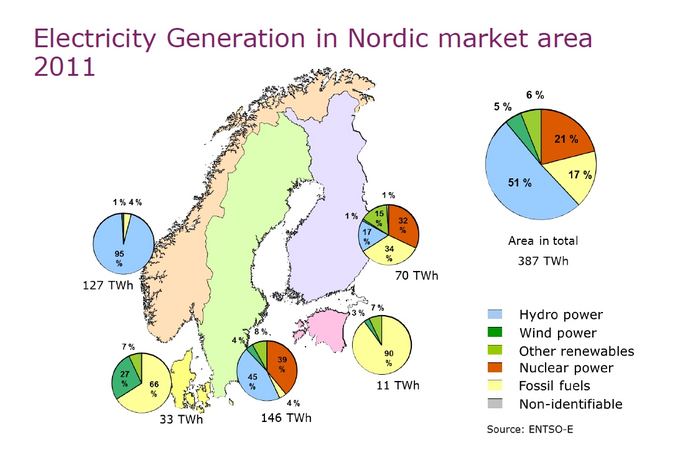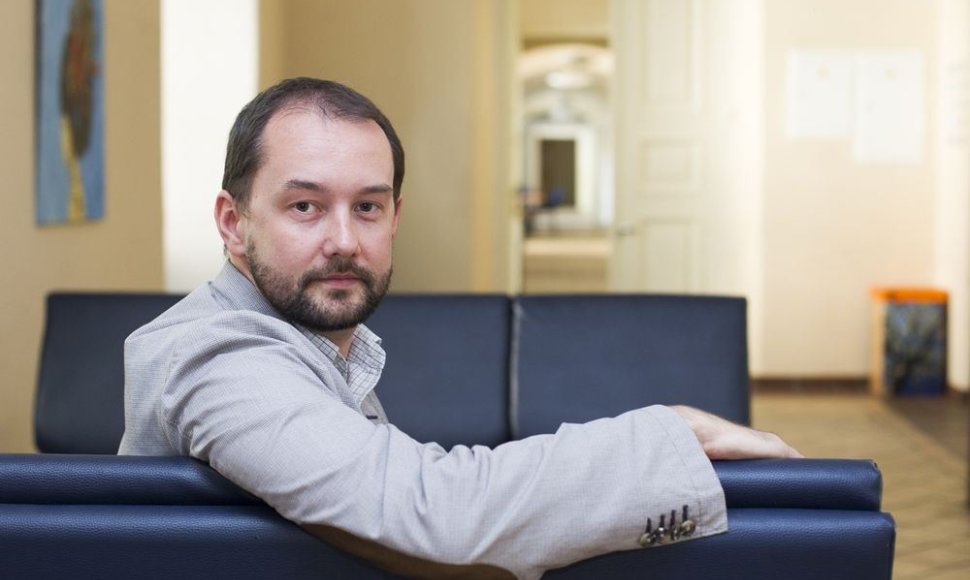“I would not like to see it done at taxpayers' expense,” admits Rimvydas Baltaduonis, professor at Gettysburg College (Pennsylvania, USA).
A nuclear power plant would lead to centralization of energy production in Lithuania, leaving little space or resources to developing other energy sources. According to Baltaduonis, the example of the United States, his adopted country, shows that decentralized energy production is more reliable and safer.
He talks to 15min about nuclear and renewable energy, Lithuania's progress, the country's gas sector, and the new topic in Lithuania's energy debate, shale gas.
– The new nuclear power plant has been the hottest topic in public debate for some years now. Another and arguably more important project, the national energy strategy, has been forgotten. Is the power plant truly of paramount importance or are we simply asking wrong questions?
– The world moves forward, developing new technologies, renewable energy sources, costs can go down in a flash. We come up with more ways of generating electricity, with people themselves producing energy for their own needs. We see much space for innovation and creativity. Since we have a lot of creative people with ideas in Lithuania, it might not be the best idea to concentrate on one project, one that would be a huge market player, one requiring constant surveillance, one vulnerable to manipulations by various interest groups. Still, it is something to be considered and discussed.
The strategy, I believe, is a much more open way of talking about it. Other interest groups are not silent either – they try to present their own arguments. It is important to listen to them all.
– If we were to build a new nuclear power plant, that would mean investing billions of taxpayers' money and centralizing electricity production. Why do strategists of the Lithuanian energy sector seem suspicious of decentralization?
I would be inclined to support a project that could draw private investment and would not depend on taxpayers' money as a backing against failure.
– I would be inclined to support a project that could draw private investment and would not depend on taxpayers' money as a backing against failure.
If private capital is reluctant to take on the risk, the question to ask is why. Is it due to political reasons? We have seen other gigantic projects that faltered as governments changed. Perhaps it would be possible to have an agreement among different parties, even pass a law to remove this risk? Perhaps private capital would then be more willing to join the project?
If the project and its risks are too great for private investors, it might be advisable to consider alternatives. Nuclear power plant is a huge venture, it would be an elephant in the room that one could not ignore.
If private investors could envisage dividends from nuclear electricity, we would be hearing more of their arguments.
I would not like to see it done at taxpayers' expense. Once our electricity sector is integrated into that of the European Union, we will have ways of selling electricity generated at the nuclear power plant. Construction costs, however, would still need to be covered by the citizens of Lithuania.
– Can we afford it, considering our demographic situation and dwindling population?
– There are numerous calculations regarding projected costs and electricity production price. They rely on a number of assumptions, including economic factors, technological innovations in energy, geopolitics. It is near impossible to categorically claim that the costs will be this or that.
We must look more broadly – demography and macroeconomic factors will also have an impact. We do not know which way the electricity will flow – from Scandinavia to Poland and Lithuania or the other way. If it were a private capital investment, it would be their problem. Since we are now talking about the state's involvement in the project, the situation is more complicated – the state would be taking on commitments.
We can see that electricity demand in developed countries is not growing as fast as it used to. In some places, it even declines. In part, this can be explained by the recent economic crisis, but many people in developed nations use power-efficient appliances. New technologies do not require as much power to light a home or a new office building. These changes in everyday lives is what will make energy sector grow nots as much as we're used to seeing it grow. If the demand stabilizes and Lithuania adopts new technologies, perhaps our industry, too, will consume less energy. Perhaps we have no need for such enormous projects.
We do not need the kind of centralized system that we had, even in Lithuania, 60 years ago.
– Two concepts are particularly popular in the public debate right now. The conservatives speak of energy independence, while economists and energy specialists prefer energy security. What do you make of these concepts? Which is more important to Lithuania – independence or security?
– We are building a new LNG terminal, which will allow us to import gas from other countries [than just Russia], and that is a huge factor in our market. It has already had an effect – Gazprom realizes very well they have not been dealt as good a hand as before. They will doubtlessly try to make good use of the monopoly they have, but we've already got a trump card in our hands.
As I observe the changing situation due to the shale gas revolution, I think that the geopolitical situation in Lithuania will get less threatening. We will be able to import gas from the US, Australia, Norway, North Africa. Sure, it will be some time before we do it.
Energy security is no simple matter either. After hurricane Sandy swept through New York, it was great to see “energy islands” in homes that had their own power generators. These homes had working fridges with cold ice-cream and could invite friends to a party to discuss recent events in a lit room.
Many people realized that they could not rely on the centralized system alone, because it went bust if something happened. Finding a solution takes time. I believe that the US will reconsider its strategy as well. Some say that the share of distributed energy is in fact an index of quality of a system.
Sure, there are technical requirements for certain energy generation sources in order to maintain grid security. But we do not need the kind of centralized system that we had, even in Lithuania, 60 years ago.
– Grid security needs some basic level of power generation. Visaginas Nuclear Power Plant would be the source ensuring it. However, once we are part of the EU energy grid, how should we look at grid security – in the framework of Lithuania or that of Europe? Could we, perhaps, build ourselves wind power plants and let Europe's major energy producers – the Scandinavian countries, Germany, and France – take care of this basic generation?
– Of course, if we have a well-integrated power grid, basic energy generation does not necessarily have to be based in the Lithuanian territory. This spring, I had an opportunity to visit the National Renewable Energy Laboratory in the US. I was rather surprised by what I saw. Scientists at the laboratory have done studies on how much renewable energy the grid could support in the future, provided that it is optimally developed. And the conclusion was that up to 60-80 percent.
The problem arises when energy producers start asking for subsidies. That skews the market and makes it harder to see which technology solutions are viable.
The United States is a big country where wind blows all the time, in one place or another. If we looked at one state in isolation, then sure, renewable energy would not seem so reliable. But if we take a wider framework, then the wind will always blow somewhere and the sun will always shine. If we are all connected in one conductive grid, then the base energy generation does not have to be concentrated in one country or state.
– Our LNG terminal was given a lofty name – Independence. But will one terminal alone suffice to ensure this independence? Gas market monopoly will be turned into an oligopoly. What other crucial reforms do we need in our gas sector?
– I think that the more connections we have, in all energy sectors, with the Western countries and the trading world, the safer Lithuania's energy system will be. The terminal is one of such connections with the Western world. We are building electricity links to Poland, Sweden.
Energy generation sources within the country are also important. Those that work in our country, great. The problem, though, arises when they start asking for subsidies. That skews the market and makes it harder to see which technology solutions are viable.
I would support a market with a multitude of energy production and supply methods competing with one another. In that way, both our consumers and businesses will have the best possible conditions to buy energy and use it to generate added value.
– In Europe, it is state subsidies that decide how energy sectors will develop. How are things elsewhere?
I've spoken to my colleagues who grew up in Pennsylvania and know the region well. They tell me that water used to catch fire even before shale gas extraction began. The region is so rich in gas that it seeps through various cracks and that's nothing new.
– In the US, it is much harder to adopt laws on subsidies for business. In most cases, they rely on the market. Over the last 20 years, very many previously regulated industries have been liberalized. The US is much less into subsidizing simply because it is much more difficult to pass laws, there are more hurdles to jump.
There are, however, programmes to support certain technological solutions or innovations. The difference between the EU and the US is that the US delivers support through innovation, through granting tax breaks, rather than direct subsidies to particular kinds of energy.
Meanwhile in Europe, we see, for instance, the price for solar energy set considerably above the market price, which helps solar energy survive. In the US, something like that is very difficult to achieve. According to the US laws, the authorities cannot set a price for energy. Government support would have to come via innovations, research funding, certain tax breaks.
– The Finns are speaking of a smart grid that would allow optimal energy use. For example, a washing machine in your home would turn on when the wind starts blowing, pushing energy cost down. What other innovations can we expect in the future?
– Smart grid opens up a lot of opportunities. Communication between digital meters and the centre alone can save a lot of money. If, previously, energy suppliers had to send people to people's homes every month to check the meters, now the same data can be obtained much more easily, cheaply, and without invading people's homes.
Smart grid technology allows to spot breakdowns in the system.
At least in America, there have been cases where, for instance, a squirrel climbs into a transformer, it blows up, and the company has to send a helicopter to fly along the line for several hundred kilometres until it finds the spot.
As for households, there already are many solutions to manage household energy consumption. For example, one can programme some electric appliances to shut down if electricity price goes up. Household energy consumption can respond to electricity prices in the wholesale market by, say, switching to energy generated with sun collectors.
I have students who have told me about how they used to live in New York, own a big battery at home, and make some money by selling energy to the city.
 |
| Electricity generation in the Nordic Countries |
Burning water in Pennsylvania
Baltaduonis lives in Pennsylvania, the state with the biggest shale gas potential. Just like in Lithuania, the issue of shale gas is very political.
“The US industry has achieved that water and air protection laws do not apply to them. That, of course, got a lot of people alarmed. In Lithuania, such distinctions do not exist and environment protection laws would be enforced much more strictly.
“The US case is exceptional also because land owners own everything underneath their property and can have economic benefit from it. In Lithuania, as well as many other countries, underground resources do not belong to people who own the surface – and that generates additional conflict,” Baltaduonis says.
In the US, just like in Lithuania, many people have seen Gas Land, a documentary that shows inflammable water coming from taps.
“I've spoken to my colleagues who grew up in Pennsylvania and know the region well. They tell me that water used to catch fire even before shale gas extraction began. The region is so rich in gas that it seeps through various cracks and that's nothing new.
“What I care about is that we in Lithuania have well thought-out environment protection regulations will clearly defined responsibilities – who would be responsible for any unforeseen consequences or proper safekeeping of chemicals used in the fracking process – in case we decide to extract shale gas,” Baltaduonis says.













